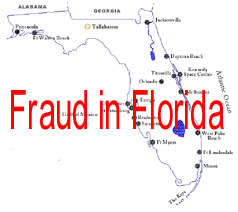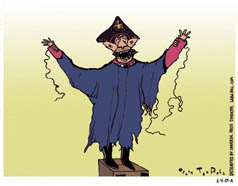Nick, How Could You?
When my daughter was seven her kitten ran away. A few weeks after the kitten's disappearance one of the other girls in the neighborhood told her that Len, a twelve year old boy down the street of less than sterling reputation, had stolen her kitten, and that she'd just seen the kitten tied to the back porch of Len's house. According to the informant, Len was feeding the kitten rat heads, and little rat head skulls could be seen strewn all about the back porch. My daughter insisted upon seeing the kitten immediately, and though the informant claimed prior commitments and declined to accompany her, my daughter ventured down the street to the alleged kitten-napper's house and stealthily proceeded to the back yard. There, she found a small back porch, but no kitten, no little kitty leash, and no rat skulls. My daughter, disappointed but unbowed, marched home and informed me that Len had stolen her kitten. My initial shock soon yielded to bemusement (a somewhat bittersweet bemusement, given my daughter's anguish) when I heard the story of the informant and her tale of the kidnapped kitten. When I rejected my daughter's demand that I confront Len's parents about his crime, my daughter insisted that she was going to inform Len's parents that Len had stolen her kitten. The following conversation ensued:
"But, sweetie, that wouldn't be true."
"It's true, my friend told me."
"But your friend said the kitty was tied to the porch, and it wasn't. That wasn't true."
"Len could have hidden the kitty in his house."
"That's true but what about the, ahem, rat heads?"
"Len could have cleaned those up."
"That's true, too, but didn't your friend say that she'd just come from Len's house and the rat heads were still there?"
At this point my daughter's defiant indignation melted to doubt, and her eyes began to well with tears. I sat her on my knee and she learned some of life's difficult lessons that day: that kitten's sometimes run away, that people sometimes lie, and that we all have to decide, every day, what to believe and what not to believe. But the task of deciding what was true, and what was not, was made easier by the fact that we learn who we can trust and who we cannot trust; who we can be certain is telling the truth, and who we should be careful to doubt, if not disbelieve.
I explained to my daughter that if she wanted to go to Len's house to tell Len's parents the story she'd been told by her friend, the tale of the kidnapped kitty, that I would go with her and we could ask Len's parents if they'd seen the kitty. But I told her that it would be a lie if she were to go to Len's parents and tell them that Len had kidnapped her kitten; that even though she couldn't be certain Len hadn't kidnapped the kitten, that she really didn't have a very good reason to believe he had.
I wonder if Nick Kristof has children?
Nick is a good guy, and his efforts to focus on suffering in this world even if it takes place in a country without large oil deposits is laudable. But Kristof takes an egregiously cheap shot at Michael Moore this morning when he faults Moore for calling the Deserter a liar, thereby positioning Moore as the "Sister Souljah" of the Iraq debate so that Nick can appear the model of probity and discretion. Here are the quotes:
Mr. Bush's central problem is not that he was lying about Iraq, but that he was overzealous and self-deluded.
Bob Woodward's latest book underscores that Mr. Bush actually believed that Saddam did have W.M.D. After one briefing, Mr. Bush turned to George Tenet and protested, "I've been told all this intelligence about having W.M.D., and this is the best we've got?"
In fact, of course, Mr. Bush did stretch the truth. The run-up to Iraq was all about exaggerations, but not flat-out lies.No, Nick, the central problem is that Bush lied. No, Nick, the conversation with Tenet doesn't demonstrate that Bush believed the WMD claim, but rather is evidence that Bush knew that the intelligence couldn't support his claims of certainty regarding Iraqi WMDs. No, Nick, the run-up to war was based on flat-out lies, the worst lies a President could tell the American people, perhaps the worst lie any human being can tell another. That's right - the Deserter made statements to the American people that he knew were not true, that he knew at the time he made them were not true, and he knew the American people would rely upon these lies in justifying the invasion of a country that had not attacked us, had not participated in any attack against us, nor threatened to attack us.
Here are but two of the Deserter's many lies:
Saddam Hussein is not disarming. This is a fact. It cannot be denied. March 6, 2003, evening press conference
The people of the United States and our friends and allies will not live at the mercy of an outlaw regime that threatens the peace with weapons of mass murder. March 19, 2003, address to the nation announcing commencement of military operations against IraqThe Deserter said "Hussein is not disarming." But in fact Hans Blix would report to the U.N. and the world the next day that Iraq was cooperating with the U.N. weapons inspectors in the disarmament process, that Al Samoud missiles were being destroyed - a step characterized by Blix in his report as a "substantial measure of disarmament" - and that Iraq was not impeding U.N. inspections; in sum, that though it could not yet be confirmed that Iraq was disarmed, Iraq was disarming. The Bush administration had been informed that these findings would be included in Blix's report. Condoleeza Rice had previously been informed by Hans Blix, and was again so informed by telephone on March 5, 2003, the day before the Deserter's press conference, that none of the intelligence provided by the U.S. or other intelligence agencies had led the inspectors to sites that contained WMDs. Rice was further aware that the CIA had "shared the best and most likely information" with Blix regarding 100 likely WMD sites in Iraq, including more than 33 sites that the CIA deemed "high priority," and that none of these sites had in fact produced WMDs or evidence of WMDs. In that same telephone conversation Rice conceded to Blix that the U.S. did not know where WMDs could be found. It is simply not credible that the Deserter was not aware of Blix's impending report, or the fact that the CIA had provided U.N. weapons inspectors with more than 100 likely WMD hiding places and none had panned out.
Even the most charitable interpretation of the Deserter's claims regarding Iraqi WMDs and Iraqi refusals to disarm cannot avoid the conclusion that he lied. For instance, one might argue that even though the Deserter had been aware that Iraq was in the process of destroying the Al Samoud missiles, his claim that Iraq was not disarming could still be construed as true if he reasonably believed that Iraq still harbored and concealed WMDs and therefore the destruction of the Al Samouds by Iraq was a mere feint at disarmament. However, the only basis the Deserter would have had for believing that Iraq was concealing WMDs was U.S. intelligence, and by March 7, 2003 all of the U.S. intelligence on likely WMD sites had been revealed as inaccurate and unreliable; the intelligence had been provided to Blix and his inspectors and had turned up more dry holes than Arbusto Oil, the Deserter's failed '70's era oil company. And yet the Deserter assured the nation on March 19, 2003, as bombs were falling on Baghdad, that Iraq threatened the world with "weapons of mass murder."
But what if the Deserter's belief that Iraq possessed WMDs, notwithstanding the impeachment of U.S. intelligence, were genuine and sincere? What if he truly believed it even though U.N. weapons inspectors, conducting unannounced site inspections, armed with the best U.S. intelligence, and unimpeded by Iraq, had failed to discover any WMDs? What if he truly believed it, even though he knew that the only sources who claimed to have direct knowledge of the whereabouts of these WMDs were extremely dubious characters produced by the slimy Ahmed Chalabi, sources that the CIA had already deemed less than reliable?
Then he should have said he "believed" Saddam had weapons, or that we "suspected" Saddam had weapons, but instead he asserted as fact that Saddam had such weapons. He should have said that he doubted Saddam's intentions to disarm, rather than claim, contrary to the facts contained in Blix's March 7th report to the U.N., that Saddam was not in the process of disarming.
He lied, Nick. These were "flat-out lies," Nick, as you would put it. He stated as fact that Saddam had WMDs, when the only basis for such a belief - U.S. intelligence - had been thoroughly impeached by the failure to find any WMD at more than 100 sites provided to the U.N. weapons inspectors by U.S. intelligence. He stated as fact that Saddam was not disarming - "this is a fact," he claimed - even though he was aware that Blix would the next day report to the U.N. that Saddam was disarming.
My daughter understood at seven years old that if you assert as fact that which you really don't have good reason to believe, it is a lie. While it is true that my daughter, even at seven, was more intelligent and had more integrity than our Commander In Chief will ever have, that fact does not absolve the Deserter of his obligation to tell us the truth before taking us to war.
He did not tell us the truth, Nick. You're right when you say he hyped and exaggerated, but you're wrong - dead wrong - when you argue that he did not lie. On March 6, 2003 and March 19, 2003 he asserted as fact that which he no longer had a reasonable basis for believing.
That's a lie, Nick. Whether it's kittens or chemical weapons, it's a lie.




0 Comments:
Post a Comment
<< Home